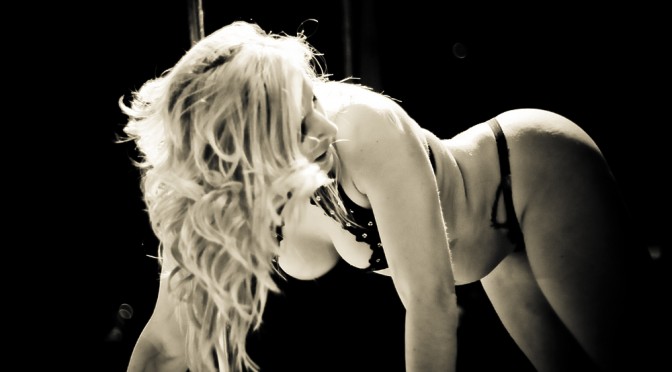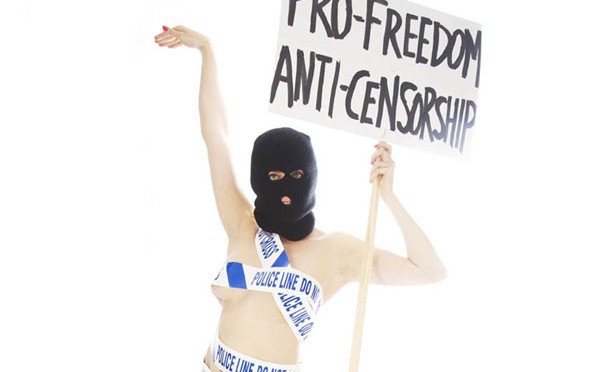Attacked by feminists on one side, and victims of poor employment practices on the other, strippers have had little support in their battles. We welcome new blogger Stacey Clare, who is a stripper and a founder member of the East London Strippers Collective.
It is said that when written down the Chinese word for “crisis” forms two characters. When translated into English these characters are understood literally to mean “danger” and “opportunity”. Right now it could be said there is a crisis within the adult entertainment industry, as legislation that seeks to censor the “threat” of open, honest and public expressions of sexual desire is gaining increasingly stronger footholds in Parliament. UK strip clubs are rapidly becoming a bastion in the battleground between freedom of self-expression and prohibitionist politics.
2014 is a time of crisis. Economic disparity and ecological disaster, mass unemployment and social unrest combine to create a climate of uncertainty. The future is unforeseeable, and no one is accountable – the perfect circumstances within which exploitation can thrive. Exploitation of labour in a capitalist framework is one thing; exploitation of sex-workers happens outside of a UK judicial system, which supposedly protects its citizens… Those that operate within the legal framework that is. Those who don’t probably deserve what’s coming to them right?
At this point in history, cases of employee discrimination that can be proven result in employment tribunals, yet strip club bosses and managers get away scot-free with discriminatory working practises of eye-watering magnitude. Strippers are regularly classified and discriminated against on account of breast-size, body-shape or skin colour, sacked without notice for any reason, fined for having chipped nails, bullied and intimidated by their superiors and customers alike. Why? Because strippers are denied employment status, leaving them with no legal protection whatsoever, despite in almost all cases being treated as employees, regardless of their right to independence. Employment rights of strippers simply do not exist, and there is no forum to speak out. However, let’s not forget that out of crisis comes opportunity.
Ladies and gentlemen, prepare yourselves for the arrival of the East London Strippers Collective. In April 2014, the ELSC held their first official meeting at a private location in Bethnal Green. There was a surprisingly good turn out of dancers, nearly all familiar with each other through the existing dancer community, and each bringing with them a wealth of experience working in the strip clubs of London. The power of this shared experience was tangibly felt in the room. A collaborative effort was made to organise a communal meal, followed by an open discussion around the dinner table that can only be described as… empowering.
What strippers have in common is simply, precisely that they have all been there. They’ve all tackled the same adversity, they’ve all been up against the same walls. They all share the embodied knowledge and experience of that feeling being onstage, nailing a strip routine and showcasing their strength and talent to an appreciative and supportive audience. They all know how demeaning it feels to hustle for tips, to fight amongst each other like cats for scraps.
There is a small but powerful group of these women who are bored of complaining about it and are now quietly discussing a better set-up. Using their working knowledge and combined wisdom, they are slowly and carefully creating a new movement; a manifesto is taking shape, underpinned by the principle of respect and the combined desire to create value and beauty. Among them are a wealth of resources and talents, as artists, designers, fitness instructors, nutritionists, writers, photographers, costumiers, and businesswomen all make up the core group. There is a buzzing almost electric potential that if they can consolidate their talents, as well as their sexual prowess, they could be an unstoppable tour de force.
There are droves of dancers who refuse to identify themselves as sex-workers, preferring instead the more evasive labels like dancer, performer, strip-tease artists or adult entertainers. The ELSC are strippers. The clue is in the name. While the ELSC openly and honestly stands in solidarity with other sex workers, it identifies a clear problem; organisations such as the International Union of Sex Workers and the Sex Workers Open University fail to represent the specific and very different agenda for strippers’ rights. Their advocacy for sex workers is invaluable and important, not in any way to be undermined or degraded – clearly however there is a significant gap where a union for strippers ought to be. By beginning to self-organise and collaborate, the ELSC is planning a series of events, from private parties to public talks, with the aim of creating a new audience who would rather be entertained by a group of radical, educated and self-reliant women, sharing their skills as well as the profits.
And undoubtedly, advocacy for strippers is needed. Already this year Diane Johnson, Labour MP for Kingston-Upon-Hull, North, has put forth the first reading of a private members bill, to ensure local authorities have greater powers to crack down on strip clubs, whether they want to or not. Existing laws give councils the option to enforce a nil policy and tighter controls on premises with a Sex Entertainment Venue license. Quite how these options can be written into statute and enforced is another thing altogether, which seems to beg the question; how well thought out is this private members bill? Sure it’s not just a stunt to curry favour with a particular pressure group and their associated electorate?
The ELSC has come together out of a shared sense of outrage and disgust among dancers, who have watched the decline in their industry and felt powerless to prevent it worsening. They have looked on, heartbroken, as their art form has been consistently dragged into the gutter; ideologically by the modern feminist movement who would seek to destroy their world, and literally by the grotesque working conditions imposed by industry operators motivated purely by profit. They seek to challenge current standards and set precedents within the industry itself, create our own set of working conditions in line with their agreed principles, and send out the message to wider society that, despite what the world thinks, they love what they do. If only they would get the chance to do it properly.

